“Republics can commit no greater error than to adopt or continue any feature in their systems of government which may be calculated to create or increase the lover of power … surely nothing is more likely to produce such a state of mind than the long continuance of an office of high trust.
I renew the pledge heretofore given that under no circumstances will I consent to serve a second term.”
~President William Henry Harrison
Inaugural Address
March 4, 1841
Little did he know…
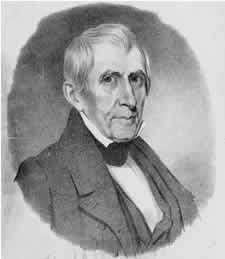
1841 – President William Henry Harrison died after serving only 32 days in office, leaving him with the unfortunate presidential record of shortest term in office.
Ironically, the man with the shortest White House tenure delivered the longest inaugural address in history, which may have been his undoing. His speech, delivered on a bitterly cold March 4 morning, contained 8,445 words and clocked in at one hour and 45 minutes.
Contemporary presidents typically give speeches in the 2,000-3,000-word range.
The 68-year old Harrison went to bed at the end of inauguration day with a bad cold that soon developed into a fatal case of pneumonia, although a medical analysis made in 2014, based on records of the White House water supply being downstream of public sewage, concluded that he likely died of septic shock due to typhoid fever.
“Old Tippecanoe” Factoids: His father, Benjamin Harrison V, was a Virginia delegate to the Continental Congress and a signer of the Declaration of Independence.
His grandson, Benjamin, became the 23rd president of the United States in 1889.
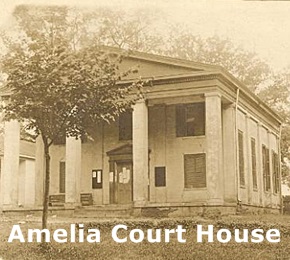
1865 – The end was very near.
Confederate General Robert E. Lee had hoped to find a supply train waiting for his troops at Amelia Court House, VA, 39 miles southwest of Richmond, but when he and his starving forces arrived there, he found that the train contained only ammunition and government papers.
Lee made the fateful decision to appeal to local citizens for any surplus food items they had – of which there was very little – instead of marching to the Richmond and Danville Railroad, the direct route southwest to North Carolina where he hoped to join up with General Joseph E. Johnston’s army.
Lee’s one-day head start on the Union was lost, and with it, soon too would be the war.
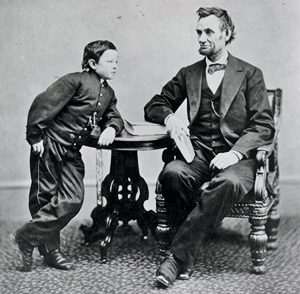
1865 – President Abraham Lincoln visited the Confederate capital of Richmond, Virginia, one day after Union forces captured it.
Accompanied by his son, Tad, a small group of soldiers, and a growing entourage of freed slaves, Lincoln walked to the Confederate White House before walking to the Virginia statehouse to see the chambers of the Confederate Congress.
That night, Lincoln dreamt of “the subdued sobs of mourners” and a corpse lying on a catafalque in the White House East Room. In the dream, Lincoln asked a soldier standing guard “Who is dead in the White House?” to which the soldier replied, “The President. He was killed by an assassin.”
Lincoln woke up at that point but the dream continued to haunt him.
Ten days later, Lincoln was assassinated at Ford’s Theatre in Washington, D.C.
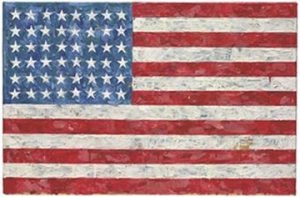
1918 – A plan was passed by Congress at the suggestion of U.S. Naval Captain Samuel C. Reid in which the American flag would have 20 stars, with a new star to be added when each new state was admitted, but the number of stripes would be reduced to 13 so as to honor the original colonies.
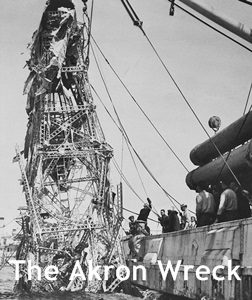
1933 – The dirigible Akron crashed in New Jersey, killing 73 people in one of the first air disasters in history.
The U.S. Navy was using the airship – at 785 feet in length, it was the largest airship built in the United States when it took its first flight two years earlier – to obtain technical data over New Jersey.
While in the air over the Atlantic Ocean, a miscommunication over directions by crew members sent the Akron directly into a thunderstorm instead of around it. The storm’s winds caused the ship to plunge nearly 1,000 feet in a few seconds.
The blimp’s water ballast was dumped in order to make the flying ship rise. However, the ballast dump thrust the blimp up too far and too fast. Critical devices and cables were destroyed and all control was lost. The Akron plunged into the ocean.
The rescue airship J-3 was sent to help the Akron crew. It also crashed in of the storm, killing two of the seven crew members on board. Only three of the Akron’s 76 crew members survived the disaster.
One of the survivors was the commander who had ordered the fateful ballast dump.
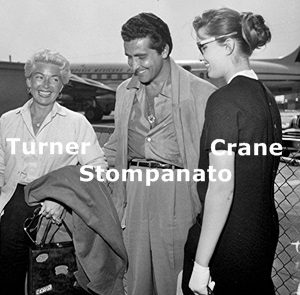
1958 – 14-year old Cheryl Crane, the daughter of actress Lana Turner, stabbed organized crime figure Johnny Stompanato to death.
Crane claimed she did it to defend her mother from a vicious beating by Stompanato. His year-long relationship with Turner had been rocky and marked with physical abuse. Crane had heard the couple arguing in Turner’s bedroom, and took a knife from the kitchen, planning to defend her mother.
Crane stabbed Stompanato in the stomach, penetrating his liver and aorta. He was pronounced dead at the scene.
The crime was later ruled a “justifiable homicide”.
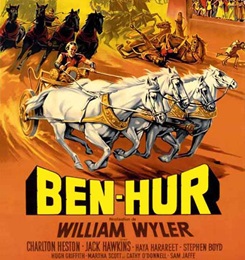
1960 – At the 32nd Academy Awards, Ben-Hur smashed the competition.
Setting an Oscar record, the film swept 11 of the 12 categories in which it was nominated, including Best Picture, Best Director (William Wyler), Best Actor (Charlton Heston) and Best Supporting Actor (Hugh Griffith).
Simone Signoret (Room At The Top) won the Best Actress award, with Shelley Winters (The Diary of Anne Frank winning Best Supporting Actress.
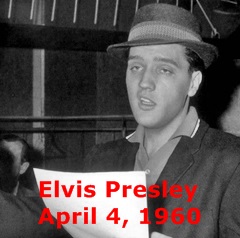
1960 – Elvis Presley recorded Are You Lonesome Tonight? at RCA studios in Nashville.
Elvis was not excited about recording the song but his manager, Tom Parker, insisted it would be a hit.
The song spent six weeks at #1 on the Billboard Hot 100.
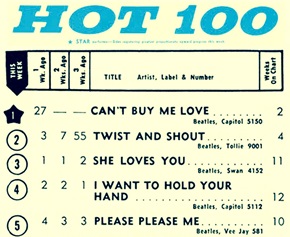
1964 – For the first (and only) time in Billboard history, one artist – The Beatles – held the top five positions on the Billboard Hot 100.
Chart Factoid: The group also had seven other singles on the Hot 100 chart that week:
31: I Saw Her Standing There
41: From Me To You
46: Do You Want To Know A Secret
58: All My Loving
65: You Can’t Do That
68: Roll Over Beethoven
79: Thank You Girl
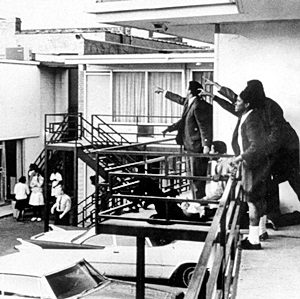
1968 – Just after 6 p.m. (CST), Dr. Martin Luther King Jr. was fatally shot while standing on the balcony outside his second-story room at the Lorraine Motel in Memphis, Tennessee.
The civil rights leader was in Memphis to support a sanitation workers’ strike and was on his way to dinner when a bullet struck him in the jaw and severed his spinal cord.
King was pronounced dead after his arrival at a Memphis hospital.
He was 39 years old.
That evening, Senator Robert F. Kennedy, a man who himself would be assassinated two months later, gave perhaps the greatest speech of his life.
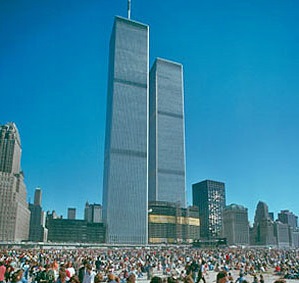
1973 – The Twin Towers of the World Trade Center in New York City were officially dedicated.
At 110 stories each, 1 World Trade Center (North Tower) and 2 World Trade Center (South Tower) provided nearly 10 million square feet of office space.
Reaching over a quarter of a mile into the sky, they were the tallest buildings in New York City, and for a brief period, they were the tallest buildings in the world.
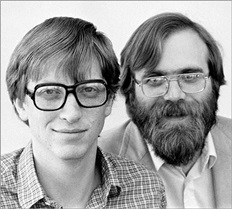
1975 – Microsoft was founded as a partnership between Bill Gates and Paul Allen in Albuquerque, NM.
Gates, then 19, and 22-year-old Allen initially called their enterprise “Micro-Soft” and formed the company to create a version of the BASIC programming language for the Altair 8800 personal computer.
Gates and Allen later dropped the hyphen and moved Microsoft to the Seattle area in 1979 and officially incorporated it in 1981.
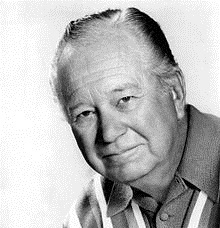
1975 – Actor Edgar Buchanan died of complications from a stroke. He was 76.
Buchanan appeared in more than 100 films and portrayed the lead in the 39-episode syndicated Western television series, Judge Roy Bean, but he is best known for his role as Uncle Joe on television’s Petticoat Junction.
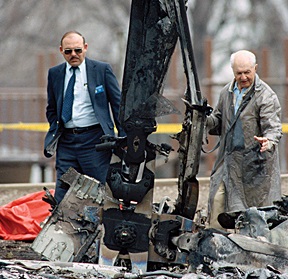
1991 – Senator John Heinz of Pennsylvania – heir to the H. J. Heinz Company – and six others were killed when a helicopter collided with his plane over an elementary school in Merion, PA.
The helicopter had been dispatched to investigate a problem with the landing gear of Heinz’s plane. While moving in for a closer look, the helicopter collided with the plane, causing both aircraft to lose control and crash.
In 1995, Heinz’s widow, Teresa Heinz, married his U.S. Senate colleague and future Secretary of State John Kerry.
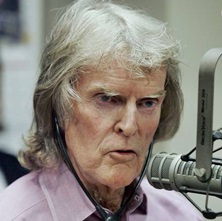
2007 – Radio host Don Imus made offensive on-air remarks about the Rutgers University women’s basketball team, describing the players as “nappy-headed hoes.”
Imus subsequently apologized on air, but public outrage cost him his job.
CBS canceled his WFAN morning show, which was syndicated, and his television simulcast on MSNBC was also canceled.

2013 – Film critic Roger Ebert died of cancer at the age of 70.
Ebert and fellow critic Gene Siskel helped popularize nationally televised film reviewing when they co-hosted the PBS show Sneak Previews, followed by several variously named At The Movies programs.
Compiled by Ray Lemire ©2020 RayLemire.com / Streamingoldies.com. All Rights Reserved.
Fascinating facts about Harrison including the Factoid! News to me!; Desperate and sad day for Lee and his troops; Holy premonition! WOW!; Reid’s idea was a good one, commemorating both the old and the new; I’m assuming that commander sadly felt guilty for the rest of his life 🙁 ; She took down a mafia man for her mama, how brave!; What a beautiful scene! WWJD! It did make me thirsty too!; I think a lot of people are Lonesome lately but classic music helps with the doldrums 🙂 ; Such an incredible feat for the Fab Four 🙂 ; This speech was incredible and the way politicians should speak and feel, also the video clip you chose had so many great pictures to go along with the tribute song, thank you for ALWAYS reminding us of ALL the important things 🙂 , The “birth” of very special Twins; I never knew Microsoft began hyphenated…this dynamic duo changed life as we knew it, for better of for worse we may never know; Buchanan galloped off into the sunset; I do remember this tragic crash, how sad and scary for all involved!; Sometimes one mistake is all it takes; Two thumbs up for a job well done, Roger; And two thumbs up for you too, Teach! Thank you for doing all you do for us…I know I’ve said that countless times but I mean it EVERY time! XOXOXOXO
Thank you, Wendyl. 🙂
William was a typical politician. He talked too much.
I assume you’re correct about the commander. That would have been a heavy burden to bear.
Yeah, Yeah, Yeah! 😉
Bobby’s speech was an attempt to calm what he knew would become nationwide violence (and it was) but at least he tried.
Those twins were majestic.
I always enjoyed Roger.
Thank you for the kind words. They are always very gratifying.
Enjoy This Lovely Weather … and Stay Safe!
XOXOXOXO
Two points I liked about Harrison’s speech – he recognized that we are a republic — not a democracy …. and he agreed that multiple terms for presidency (I think for any office) can be dangerous.
Lincoln’s dream was eerie …. he was such an interesting man and was haunted by so many circumstances he was faced with …
I can’t imagine what it was like for the crew of the Akron — the terror they must have felt. So sad…
Little did we know the role the twin towers would play in our history
I never liked Don Imus – I thought he was crude. Unfortunately there are more and more crude personalities today … with less and less criticism of their style …
Thanks, Barbara. 🙂
If only Harrison could have made those points with (a lot) fewer words!
Imus may have been crude but he was nowhere near as bad as Howard Stern (a genuine pig, IMO).
Rock The Weekend!